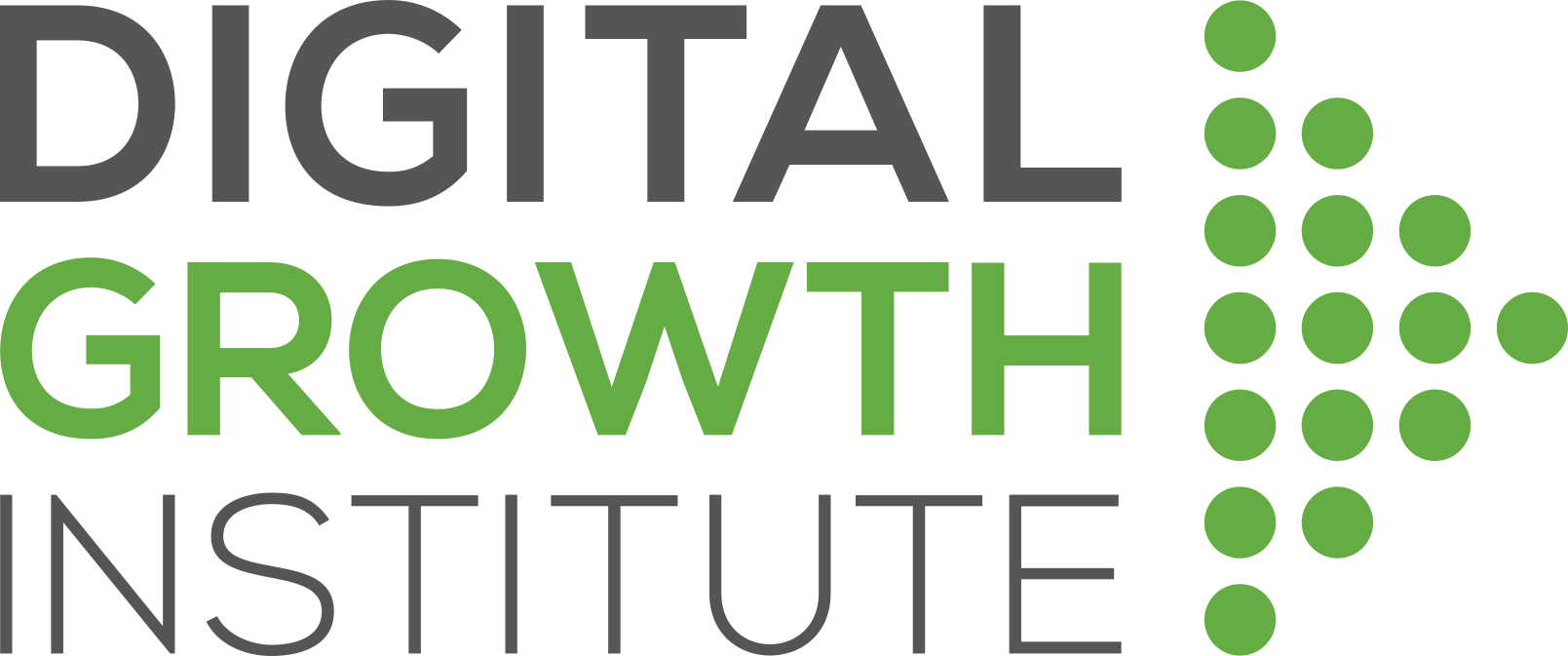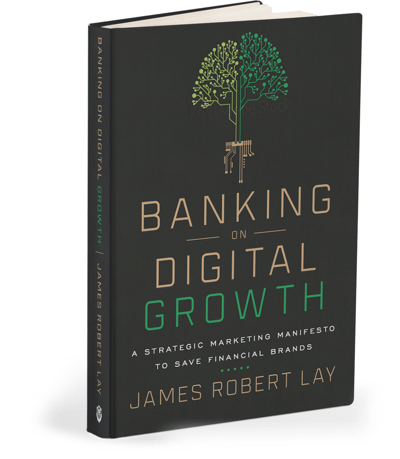I am often asked, “What do you suggest is one thing that we should start doing to generate even more digital loans and deposits?" In a general sense, there are many things that you could do to generate more digital loans and deposits.
- You could develop a digital growth strategy to provide you with an annual strategic blueprint, clarity and a roadmap for the future based on where you've been, where you currently are and your specific goals for growth.
- You could optimize marketing automation and campaigns, or adopt a marketing automation platform in the first place.
- You could focus on conversion rate optimization by running quarterly digital secret shopping studies on your most important digital asset from a growth standpoint—your website—to transform it from a glorified online brochure into a website that sells.
- You could run targeted ad and email campaigns powered by data and insights, getting people the right message at the right time, based upon where they're at in their own digital consumer buying journeys.
- You could systematize and operationalize your content production and promotion efforts in order to be more efficient with the content that you're already producing.
The list really could go on and on, but there is a better path forward for you.
Digital growth does not come from doing more. When you keep adding to your plate, there's a good chance that you're increasing complexity, which ends up adding confusion and creating chaos and conflict.
Simplify Before You Multiply
I recommend starting with a different approach: do less.
We must simplify before we maximize our digital growth potential. Growth does not come through confusion. Growth is not born out of complexity. Growth does not come from taking on more.
Growth comes from letting go and “dying” to our past selves. I introduced the concept and one of my personal maxims, memento mori, on a previous podcast. Memento mori is old Latin for, "Remember your death." This should not be a morbid thought, but rather a freeing one because when we let go of what has got us to where we are today, we create space and time to take on new things that will keep us moving forward to where we need to go tomorrow.
Think about a tree. For a tree to grow, it must let go of and lose its leaves. Its leaves are its primary source of food and protection. One could argue that when a tree loses its leaves, it appears to be naked and vulnerable.
But through this act of loss—of death, a vulnerability—the tree creates room for new and even stronger growth in the spring. Furthermore, a tree grows from two primary elements: sunlight, and water. But taking on too much sunlight or too much water can harm and even kill the tree.
This is exactly what I see happen at banks and credit unions when it comes to digital growth. It doesn't matter if you're on the marketing, sales or leadership team. Everyone tends to have a habit of taking on more and more tasks, projects and activities. But we do so without letting go of ones that no longer create value.
Create a Don’t-Do List
Here's the good news: This habit of taking on more without letting go does not have to continue for you and your team. Instead, I want you to commit to making a not-to-do or a don't-do list. I want you to start keeping a list of things, activities, tasks, projects, etc. that you can give up or stop doing.
.png?width=2160&name=Ep.%2028%20-%20What%20got%20us%20here%20today%20(1).png)
Over time, this list of items—this don't-do inventory—will leave you with two choices.
- You can elevate these items to others. Delegation, a lot of times, feels like pushing things down on others, but elevation is about moving something to a new level, giving it to someone who could do that project, task, or activity even better than we ever could.
- You can stop doing these projects, tasks, activities altogether because they no longer create value for your financial brand.
So, I want you to keep this don't-do inventory on your desk and ask your team members to do the same. What should you put on this list? What should you put on this don't do inventory?
Here are five questions you can ask yourself to help you build your inventory:
Determining Your Don’t-Do List
- What are the things that you want to say no to, but somehow can't?
Dive deep into that idea. Why do you feel you are not empowered to say no to these things? What would happen if you said no? - What are the biggest distractions that pull you off focus and keep you from doing deep, important, meaningful work that needs to get done, that will create exponential value?
Maybe it's having email and social media on your phone. Maybe it's being accessible at all times. Maybe it's the pointless meetings that we attend for meetings’ sake that we've all been in. - What are the tasks that end up finding their way to you but would be better off either being delegated or deleted altogether because they emotionally drain you?
- What tasks are you working on right now that have a low impact on the value creation you're contributing to your financial brand…even though these low-impact tasks suck your time and energy?
This might be the small project or the small fires that you have to keep putting out, and they continue to get in a way of you focusing on the bigger initiatives that will create far more value for your team and your organization. - What are you working on now that you know is not really creating any value, but you continue to do it because that's the way it's always been done?
This really takes us all the way back to the first question: what are the things that you want to say no to, but somehow can't? To dive deeper into that thought: Why do you feel that way? Why do you not feel empowered to say no to those things?
I want you to use this don’t-do inventory when you review your progress of what you've accomplished along your digital growth journey and celebrate your wins with your team. During your review of this don't-do list, this don't-do inventory, I want you to tag each item in one of three different ways:
- Distraction: Things that pull you away from doing deep work or prevent you from creating value for your financial brand.
- Delegate: Items that you can elevate to someone else who would create more value because they are working in their “growth ability,” which encompasses the few activities that they can commit to that create the greatest value for their self, their team and their organization.
- Delete: Items or actions that you can just simply say stop doing altogether.
There’s caveat to this simple exercise. It is much harder to implement and stop doing activities—activities that have been historically rooted in the past—because oftentimes we have wrapped our identity around those activities. But what got us to where we are today will not get us to where we need to go tomorrow.
Say No vs. Yes
Some find it hard to say no, and they end up doing things they are not fully committed to. Saying yes to something feels good at the moment, especially if we're the type of people that want to help someone else. There are a lot of those people in banking and financial services because that's what we do; we help people with their financial situations.

But saying yes carries a cost. When we end up saying yes more than we end up saying no, we become very, very busy. But being busy does not predict future success. In fact, being busy is a detriment to future success because you’re often busy doing the wrong things, which wastes time, effort and energy.
Think about saying no and saying yes to things in terms of money. When you say yes to something, you're spending money in the form of time, effort and energy. When you say yes more than no, it is easy to overdraft your personal T (time) account and begin to feel confused, frustrated and overwhelmed with whatever it is that you're working on. When you say no to things, it's like you're saving money.
You are saving time, effort and energy to commit and invest it into working on something even bigger and better that will create far more exponential value than the fires that you've become accustomed and used to putting out, the distractions that you've grown habitually used to dealing with.
It is easy to say yes, and it is hard to say no. But before you say yes to taking on something new, have the hard and honest conversations with yourself and your team. Is whatever it is that you're being asked to do really necessary? It might be. If it is, and you do take on something new, then you have to ask yourself: What can you say no to? What can you delegate? What can you delete altogether?
We have to create that space and time. We have to let go of the past to create space and time for the future.
Consider Your Next Steps
It’s time to consider the things that you can stop doing, so whenever you do receive recommendations for what you can do to maximize your digital growth potential, you'll already have the space, time, effort and energy to do those things with courage and confidence.
We must all be aware of the digital distractions that take a toll on us, suck our time and pull us away from the work we need to do to create value for our financial brands and, more importantly, the people and the communities we serve. Going forward in this digital world, there will be exponential "opportunities" available for us to focus on.
But being busy is not about being good at everything. Growth comes from being great at just a few things that create the greatest value for our financial brands and for the people and the communities we serve.
Being busy is not about working harder or taking on more. It's about working smarter and elevating tasks, activities and projects to others, including automation and AI, because those others will do the tasks even better than we could've ever done ourselves.
Being busy is often tied to perfectionism, but this is oftentimes only a matter of our own perspective of reality. Our idea of perfectionism is based on what we're working on and how good we think that is. However, productive and exponential growth is not rooted in ourselves. It is rooted deeply in a purpose greater than ourselves.
I want to leave you with a thought: Steve Jobs once said, "People think focus means saying yes to the thing you've got to focus on, but that's not what it means at all. It means saying no to the hundred other good ideas that are there. You have to pick carefully. I'm actually as proud of the things we haven't done as the things we have done.”
Innovation is saying no to a 1,000 things.
So what will you commit to stop doing?
What leaves will you commit to shedding this fall?
What will you commit to say no to going forward?
This article was originally published on December 9, 2020. All content © 2024 by Digital Growth Institute and may not be reproduced by any means without permission.





